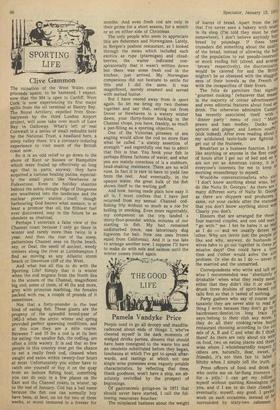SPORTING LIFE
Clive Gammon
The ruination of the West Wales coast proceeds apace, to be hastened, I expect, now that the M4 is open to Cardiff. West Cork is now experiencing its first major spills from the oil terminal at Bantry Bay. The Royal Artillery, expelled from Shoeburyness by the third London Airport project, will soon take over much of Luce Bay in Galloway. What's' left of real Cornwall is a series of small redoubts held by the National Trust, a headland here, a steep valley there. It's a coronary-inducing experience to visit much of the British coast now.
So it is an odd relief to go down to the shore of Kent or Sussex or Hampshire which were fouled up effectively so long ago that in parts, anyway, they have acquired a curious healing patina, especially the small ports like Newhaven or Folkestone. Even the holiday shanties behind the noble shingle ridge of Dungeness are weathered into the landscape and the nuclear power station / itself, though harbouring God knows what menace, is at least a promise that oil, the filthiest fuel ever discovered, may in the future be as obsolete as charcoal.
Perhaps I entertain a false view of the Channel coast because I only go there in winter and rarely more than twice in a year. And then the roar of the steep, patternless Channel seas on Hythe beach, say, or Deal, the smell of ancient, weedy timbers along the river at Littlehampton I find as moving as any Atlantic storm beach or limestone cliff of the West.
And what has all this to do with the Sporting Life? Simply that it is winter when the cod migrate from the North Sea to the scours of the Channel, magnificent big cod, some of them, of 40 lbs and more, grey with primrose marbling, the females packed with roe, a couple of pounds of it sometimes.
Not that a forty-pounder is the best kind of eating fish. These giants are the progeny of the splendid brood-year of 1962-3 when the arctic winter and spring provided perfect spawning conditions, and at this size they are a mite coarse. Between 7 and 15 lbs a cod is at its best for eating: the smaller fish, the codling, are often a little watery. It is sad that so few people in this country ever get the chance to eat a really fresh cod, cleaned when caught and eaten within twenty-four hours at most. Unfortunately you either have to catch one yourself or buy it on the quay from an inshore fishing boat, something you can do only in a few places on the East and the Channel coasts in winter, up to the end of January. Cod has a bad name because the fish one can normally buy have been, at best, on ice for two or three weeks, at worst immured in a freezer for months. And even fresh cod are only in their prime for a short season, for a month or so on either side of Christmas.
The only people who seem to appreciate this are fishermen and Norwegians. Lately, in Bergen's poshest restaurant, as I looked through the menu which included such exotics as rype (ptarmigan) and cloudberries, the waiter indicated conspiratorially that it wasn't written down but there was some fresh cod in the kitchen, just arrived. My Norwegian companions did not hesitate to settle for this and I did the same. It was magnificent, merely steamed and served with melted butter.
But I have veered away from le sport again. So let me bring my two themes together and say that, setting out from Dover or Newhaven in a watery winter dawn, your thirty-footer bucking in the Channel chops, you have, frankly, as much a pan-filling as a sporting objective.
One of the Victorian pioneers of sea angling would allow the cod no more than what he called " a stately assertion of strength" and regretfully one has to admit that this is true. You hook your fish in perhaps fifteen fathoms of water, and what you are mainly conscious of is a stubborn, head-shaking resistance. There are no wild runs. In fact it is rare to have to yield line from the reel. And eventually, in the opaque water, the great bulk of the fish shows itself to the waiting gaff. And now, having made plain how easy it all is, I must confess that I have just returned from my annual Channel codfishing trip without so much as a roe for boiling or smoking. Even more regrettably, my companion on the trip landed a thirty-four-pounder within minutes of our starting to fish. My bait remained undisturbed (once, one laboriously dug lugworm for bait. Now one uses frozen squid from California). And it is too late to arrange another now. I suppose I'll have to make do with sole and salmon until the winter comes round again.










































 Previous page
Previous page